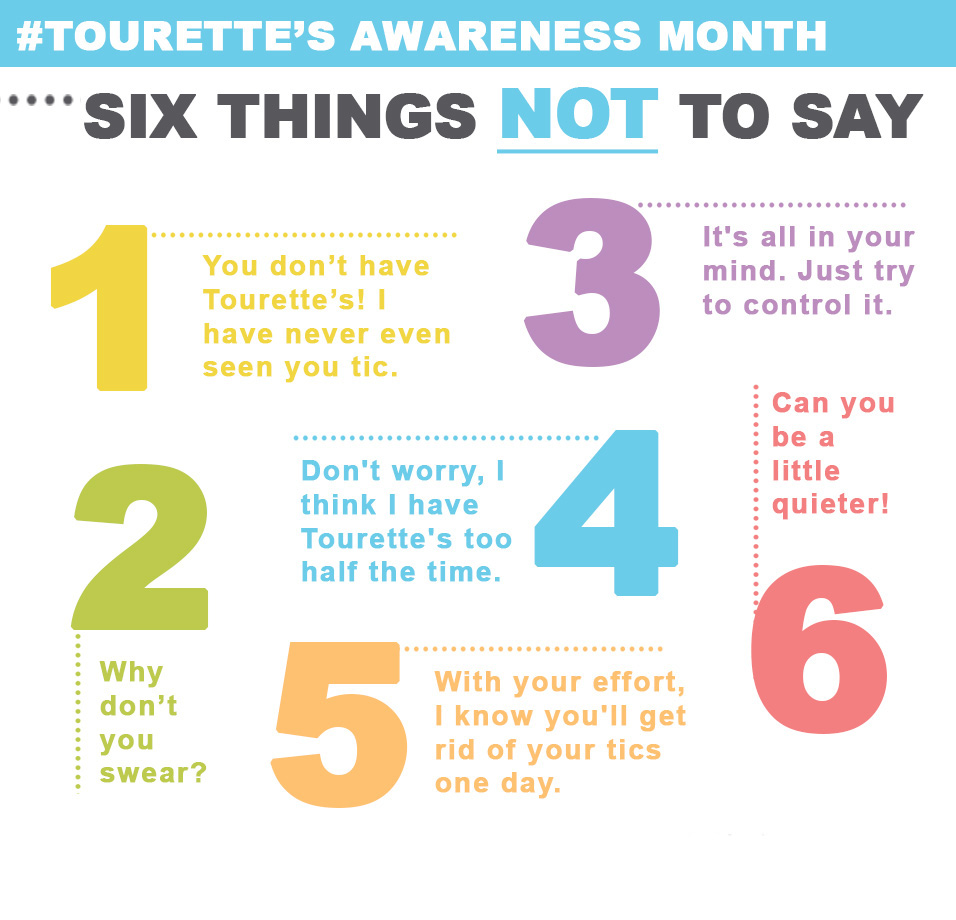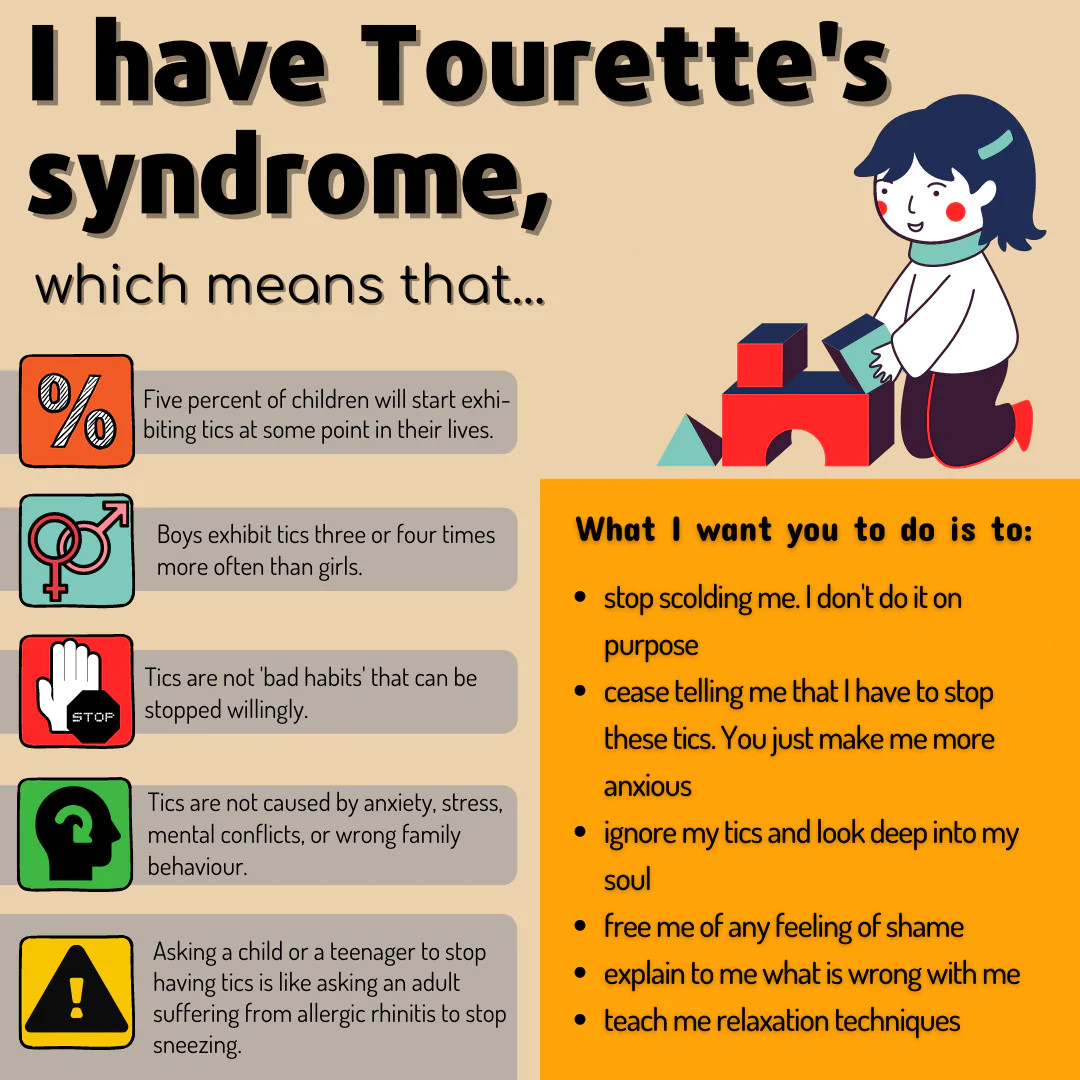Understanding Tic and Tourette’s Syndrome
Tic and Tourette’s Syndrome are neurological disorders involving repetitive movements or sounds. Although they share some similarities, there are distinct differences between the two. By understanding the unique characteristics of each condition, we can better support families living with tic and Tourette’s Syndrome.
What is Tic Disorder?
Tic disorder is characterized by involuntary, repetitive movements or vocalizations called “tics.” These tics can be either motor (involving movement) or vocal (involving sounds). They can range from mild to severe in intensity and may not occur every day. Common motor tics include eye blinking, head jerking, shoulder shrugging, and facial grimacing; common vocal tics include throat clearing, sniffing, coughing, and grunting. The severity of a person’s tics can vary over time—they may become more frequent during periods of stress or excitement. Sometimes, people only experience tics for a few months before disappearing altogether.
What is Tourette’s Syndrome?
Tourette’s Syndrome (TS) is a type of Tic Disorder that involves both motor and vocal tics that last for at least one year. People with TS often have difficulty controlling their impulses, leading to other behaviors such as impulsivity, obsessions/compulsions, difficulty focusing on tasks, social anxiety, and emotional outbursts. While most people with TS do not have any cognitive impairment associated with the condition, others may experience difficulties related to learning disabilities or attention deficit/hyperactivity disorder (ADHD). It is important to note that everyone experiences TS differently; symptoms vary in frequency and severity from person to person.
To be diagnosed with TS, a person must:
Be diagnosed by a qualified medical professional.
Tourette Syndrome (TS) is a neurological disorder that affects an individual’s manner of speaking, making involuntary vocal and motor tics. For an accurate TS diagnosis, the patient needs to be assessed by a qualified specialist, such as a neurologist or psychiatrist, who is well-versed in conditions of this nature. An extensive medical history may be taken in addition to physical and behavioral examinations that can help detect symptom patterns over time. From this information and other observations, the specialist can make a definitive diagnosis and offer comprehensive treatment plans. Diagnosing TS is not an exact science; however, when conducted by a dedicated professional familiar with the condition, it provides those diagnosed with TS the hope of receiving quality care and treatments.
Tourette Syndrome (TS) is a neurodevelopmental disorder that causes involuntary and uncontrollable movements and vocalizations. Diagnosis for TS seeks to identify those individuals whose motor and vocal tics consistently last for more than a year. To be diagnosed with this disorder, the individual must have had multiple motor tics (involuntary movement of particular body parts) and at least one vocal tic (involuntary sounds or words). Furthermore, these symptoms must occur over multiple years. They should not be associated with other conditions such as drugs, medication, or environmental triggers to be considered an accurate diagnosis.
Tourette Syndrome (TS) is an inherited neurological disorder characterized by repetitive, involuntary movements and vocalizations called tics. To receive an accurate diagnosis of TS, it’s essential to note when the symptoms first began, as individuals must be younger than 18 years old for a diagnosis to be given. While many believe that all people with Tourette Syndrome exhibit uncontrollable outbursts of profanity or vulgar language, this is rare. Most TS patients experience milder forms, such as blinking or throat clearing. By getting an early and accurate diagnosis, affected individuals can begin receiving the necessary treatments and support they need to manage their condition best.
Tourette Syndrome (TS) is a neurological disorder characterized by tics, which are sudden, recurrent, and involuntary movements and vocalizations. To be diagnosed with TS, a patient must have experienced both motor and vocal tics for at least one year, with the tics occurring without a break of more than three months. Furthermore, to be diagnosed formally, the patient must experience distress or difficulty due to the tics or have impaired functioning due to their symptoms. While there is no cure for TS, various forms of treatment can help lessen symptoms and improve the quality of life for those living with this condition.
Tourette Syndrome (TS) is a neurological disorder often manifested in tics and obsessive behaviors. Those seeking to receive a diagnosis of TS must first meet specific criteria; namely, they shouldn’t have gone more than 12 months without experiencing any tics. This requirement brushes aside diagnosis for those with an intermittent disorder or who only experience mild symptoms over long periods. As such, TS remains an invisible illness—challenging to diagnose and still misunderstood amongst the medical community. It’s vital that those living with this syndrome be diligent in informing healthcare providers of their current symptoms, or else their condition may not be effectively addressed.
Tourette Syndrome (TS) is a neurological disorder that causes people to have involuntary physical and vocal tics. When seeking a TS diagnosis, doctors must first rule out other medical conditions that can lead to similar symptoms, such as seizures or attention deficit hyperactivity disorder (ADHD). A comprehensive evaluation involves checking physical health and mental well-being; performing in-depth queries into family and neurological history; and, when appropriate, reviewing school records and neuropsychological testing. To be confident of an accurate diagnosis, it’s essential to ensure no competing explanations can be found for the tics reported by the individual.
Tourette Syndrome (TS) is a neurological disorder that causes tics, involuntary movements, and vocal outbursts. To qualify for a diagnosis of TS, the individual must meet the diagnostic criteria outlined by the Diagnostic Statistical Manual-V (DSM-V). This criterion requires that no medications be taken to explain the tics present in the individual. Tics can vary from person to person but can become cumbersome and even interfere with everyday life. Suppose you suspect your child may have TS. In that case, it is strongly advised to get them evaluated by a professional to determine whether or not those tics constitute an actual diagnosis of TS. Early identification and proper treatment are instrumental in mitigating the effects of this condition.
Having a persistent tic disorder can be pretty alarming. It is essential to rule out any psychological stress or anxiety, as this may be the underlying cause of the tic. If unseen elements contribute to the tic, it is critical to identify and address them. Various treatment options are available for psychological stress, such as cognitive behavioral therapy and medication. They can be used in tandem or independently, depending on the individual needs of the patient. Seeking professional help is essential, as it will provide an avenue toward an improved quality of life and tic reduction.
Diagnosing Tourettes Syndrome can sometimes be tricky because the symptoms, such as involuntary and repetitive physical or vocal tics, could be attributed to taking illegal drugs. As part of their diagnostic process, doctors must ensure that any illicit drug use is not what is causing the tics before making a definitive diagnosis of Tourettes Syndrome. In addition to drug testing, physical exams, and neurological evaluations are usually necessary to exclude other possible causes of tics before Tourettes Syndrome can officially be determined. This extensive evaluation ensures that an accurate and specific diagnosis is made so that the best possible treatment plan can be tailored and implemented.

Persistent (Chronic) Motor or Vocal Tic Disorder
Persistent (Chronic) Motor or Vocal Tic Disorder is a type of Tourette Syndrome. This neurological disorder is characterized by involuntary and repetitive synchronous movements, such as tongue thrusting or blinking, and vocal tics, such as grunts and throat clearing. Stress levels and tiredness can affect a person’s ability to suppress or manage these tics, making it difficult for them to control their impulses when under duress. Although there is no cure for this syndrome, there are treatments that can improve symptoms, such as medicine and cognitive-behavioral therapy. It’s important to remember that individuals with this diagnosis are not limited; they require different support tools than someone without this condition. Individuals with persistent (chronic) motor or vocal tic disorder can have fulfilling lives. with the right resources and an understanding attitude
To be diagnosed with a persistent tic disorder, a person must
- have one or more motor tics: Those with Tourette’s Syndrome often have motor or vocal tics. Motor tics usually include brief movements like blinking, shrugging the shoulders, twitching, or blinking. Vocal tics involve saying words, phrases, or noises aloud, such as humming, clearing the throat, kissing noises, clicking sounds, or even yelling out a word or phrase. While some people with Tourette’s may experience both motor and vocal tics concurrently, typically, it is one type of tic or the other. It is important to note that those who experience only minor tics rarely need treatment unless the disruptive level of frequency and intensity is too challenging to handle.
- Have tics that occur many times a day: People with tics might experience random, sudden movements or vocal noises that they are sometimes unable to control. In some cases, these tics can be minimal and occur occasionally, but there could be frequent occurrences for others. While the exact cause of tics is unknown, researchers believe that genetics or environmental factors may play a role in their development. If you or someone close to you has recurrent tics, you must speak to your doctor about treatment options with potential long-term benefits.
- Have tics that start before age 18: These can range from simple staring or blinking to more complex twitches or movements like head or shoulder jerking. While there is no known cure for this condition, treatments range from focusing on behavioral interventions to medications that help reduce the severity of the symptoms. People with Tic disorder need to develop self-awareness tools to better manage and cope with their condition, thereby aiding in leading an everyday life. Additionally, constant social support and understanding of family members, friends, and colleagues help tremendously deal with Tourette’s Syndrome daily.
- Have symptoms not due to taking medicine or other drugs: While tics often result from an underlying medical condition or as a side effect of medication and drugs, they may also occur spontaneously. In such cases, doctors call this primary or essential tic disorder. Symptoms of Essential Tic Disorder vary and may include eye blinking, facial grimacing, shoulder shrugging, or even more complex movements like neck jerking or head banging. Diagnosis is based on severity, frequency, and duration of the symptoms; family history; physical exam; and whether other conditions are present. If a doctor suspects Essential Tic Disorder, he may recommend behavioral therapy to learn techniques to manage the tics, occupational therapy to understand how they affect your daily life, and medications that help lower the urge to tic.
Provisional Tic Disorder
Provisional tic disorder (PTD) is a type of tic disorder that typically appears in children or adolescents and is characterized by one or more motor or vocal tics. To be officially diagnosed with PTD, someone must have had their tic(s) consecutively for no longer than 12 months and must have started before age 18. Additionally, the person’s symptoms cannot be attributed to any other underlying medical condition or the use of medicine or drugs. Lastly, someone cannot have been previously diagnosed with Tourette Syndrome (TS) or Persistent Motor or Vocal Tic Disorder. It’s essential that anyone experiencing signs of PTD seek out an evaluation from a healthcare professional to obtain an accurate diagnosis and decide on a proper treatment plan.
Sudden Onset of Tic-Like Behaviors
Understanding the differences between tic disorders and the sudden onset of tic-like behaviors is essential, as they are two distinct entities and require different treatment regimens. Unlike tic disorders such as Tourette syndrome, people who develop these sudden onset symptoms usually have no history of a tic condition. Additionally, teenagers appear more susceptible to this particular behavior, with girls showing a greater tendency towards it than boys. Sometimes, a group of children may acquire similar movement-related symptoms at once. Researchers continue investigating potential causes and treatments associated with tic-like behaviors that arise suddenly in individuals without a prior diagnosis.
What to Do When Your Child is Diagnosed with Tourette Syndrome
Taking an active role in the healthcare of a child with Tourette’s Syndrome (TS) can significantly benefit the child and the entire family. It is essential to discuss any concerns or questions with a healthcare provider to ensure that all pertinent information is understood and correct decisions are made. The more one learns about the condition, the better their chances of understanding and appropriately treating it. Start by reading our pages on TS facts, treatments, and other relevant concerns – this will give parents a good grounding when discussing options with their healthcare provider. One should also remember to ask about additional conditions or symptoms beyond tics, as many children with TS also have other mental and behavioral conditions that require particular attention. With an adequate understanding of TS and its related conditions, families can make informed decisions based on proper medical advice and knowledge.
Tic disorders and Tourette’s Syndrome have similar characteristics but differ in the type of tic present and the duration of symptoms. Kno, or signs and symptoms of these conditions, can help us better support those living with them. Suppose you or someone you know has been diagnosed with a tic disorder or TS. In that case, many resources are available to help manage symptoms, including therapy, medications, and lifestyle modifications such as relaxation techniques and regular exercise. Reach out today for more information on how to get the best care for your loved one with Tic Disorder or Tourette’s Syndrome!
Contact us today at 816.819.5166 or schedule your appointment online.












